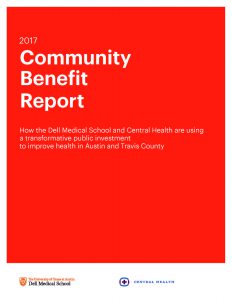Escuela de Medicina Dell de la Universidad de Texas en Austin
AT THE UNIVERSITY OF TEXAS AT AUSTIN
THE DELL MEDICAL SCHOOL AT THE UNIVERSITY OF TEXAS AT AUSTIN is committed to improving safety-net health care delivery in Central Texas through the development of an integrated delivery system.
In July of 2014, the Central Health Board of Managers approved an AFFILIATION AGREEMENT with THE UNIVERSITY OF TEXAS.
As part of the agreement, the COMMUNITY CARE COLLABORATIVE will transfer $35 million each year to UT to support safety-net healthcare delivery transformation through the Dell Medical School.
Dell Med’s Support for Central Health’s Mission
CENTRAL HEALTH OBJECTIVE 1: DEVELOP AND EXECUTE HEALTH CARE DELIVERY STRATEGY BASED ON PEOPLE AND PLACE
• Launched 5 subspecialty clinics serving MAP patients including women’s health, musculoskeletal and neurosciences. Clinics include a focus on person-oriented and team-based care. Strategy 1.1
• Within 7 months of opening, Dell Med has already had more than 2000 visits came from MAP patients, and more than 3000 from all public payers, including Medicare & Medicaid. Strategy 1.1
• Planning for new clinical service lines that will improve access for low-income and uninsured patients to needed specialty care services. Strategies 1.1 & 2.1
Central Health Objective 2: Implement patient-focused and coordinated health care system
• Eliminated 12-month wait for MAP patients to see a specialist for orthopaedic care and established measures to improve patient-reported outcomes. Now, MAP patients needing care for conditions like arthritis or hip pain can rapidly get access to care. Strategies 2.1 & 2.2
• Improved opioid management in safety-net hospitals to ensure the health of mothers and babies isn’t compromised while pain is managed effectively during childbirth. Strategies 2.2 & 2.3
• Initiated a colon cancer screening project for 15,000+ CommUnityCare patients. Strategies 2.1 & 2.4
• Increased number of medical residents in Travis County who provide more than 500,000 hours of care under faculty supervision, with the majority of hours spent at sites that serve low income and uninsured residents. Strategies 1.1 and 2.1
Central Health Objectives 1 & 2
• Recruited third medical class supported with need-based scholarships, to produce physicians who can focus on community health. Strategy 2.1
• Deliberately invested in recruiting clinical expertise in improving health and medical equity, which included helping partners like People’s Community Clinic better serve kids with asthma. Strategy 2.4
• Implemented second year of program to regularly ask community members to propose grassroots health solutions defined by community needs. Currently 12 programs are receiving deeper support from Dell Med, with the next round of 12 almost announced. Strategy 1.3
What’s Next
• Planning new clinical programs together with Community Care Collaborative, Central Health and CommUnityCare
• Creating new care models at partner clinics so patients with more than one condition can receive comprehensive care
• Establishing measures for patient-reported outcomes
• Launching a world-class pediatric and congenital heart disease program led by the doctor who built the top program in the country
• Increasing the number of doctors providing services to low-income and uninsured patients with 22 new residents, bringing total to 306
Resources
Previous Community Benefit Reports
The documents available below represent Central Health’s agreements with The University of Texas System and Seton Healthcare Family, in support of the Dell Medical School at The University of Texas at Austin, University Medical Center Brackenridge, and Dell Seton Medical Center at The University of Texas.
UT Affiliation Agreement
The Affiliation Agreement between The University of Texas at Austin (UT), Central Health, and the Community Care Collaborative (CCC) is the result of a multi-year collaboration with our health care partners and the community. The agreement among the three entities formalizes the relationship as well as the transfer of $35 million per year to support the Dell Medical School.
UT/Seton Ground Lease
The Ground Lease, as approved by the Central Health Board of Managers on Oct. 15, 2014, will allow Seton to construct the new teaching hospital on UT property, where students at the new medical school can be taught and trained. It will ensure the hospital continues to provide basic, safety-net services to vulnerable Travis County residents who lack health insurance.

